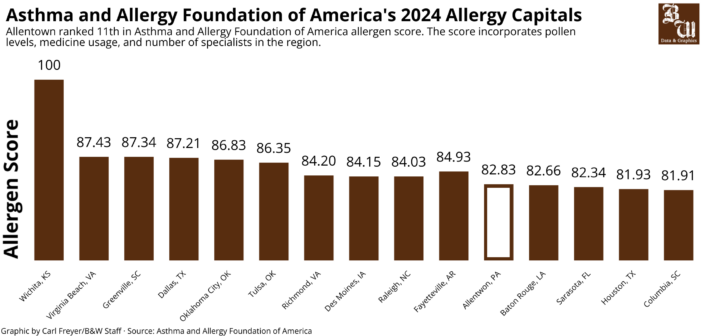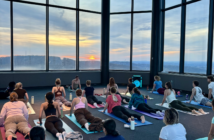For many Lehigh students, the changing leaves signal more than the arrival of a new season — they also serve as a reminder to take allergy medication before heading outside.
The Lehigh Valley has been named one of the “allergy capitals” of the U.S. by the Asthma and Allergy Foundation of America. In the foundation’s 2024 report, the area was ranked the 11th worst city in the country for seasonal allergies.
Further, a survey of over 100 Lehigh students conducted by The Brown and White found more than 50% of students with seasonal allergies believe their symptoms are worse on campus than at home.
Steven Bowers, medical director of Lehigh’s Health and Wellness Center, said there’s a prevalence of allergens on campus. He said the Lehigh Valley is one of the worst areas in the country due to its surroundings of mountains and rural areas.
“There are a lot of trees, a lot of grass and a lot of pollen,” Bowers said. “It kind of just sits in the Valley (which) makes it bad.”
Bowers said many students visit the center seeking relief from their allergy symptoms.
The first question he tends to ask these patients is,“Where are you from?” He said students who are new to the area may experience seasonal allergies for the first time in their lives after arriving at Lehigh.
For those with prior allergy experience, he said symptoms are likely to increase in severity.
He said the Health and Wellness Center provides support for students struggling with seasonal allergies in different ways depending on the specifics of the situation.
“We can figure out if it’s allergies or if it’s some sort of other upper respiratory infection going on,” Bowers said. “That’s step one.”
Margaret Renneisen, a physician at the Health and Wellness Center, said it’s important for students to ensure their symptoms are actually from allergies and not a respiratory infection. This can help manage symptoms properly.
“If you come into the Health Center, we can evaluate you and certainly give you recommendations,” Renneisen said. “We have a couple of medications in the Health Center that we can also provide.”
If the center confirms the student’s symptoms are consistent with allergies, Bowers said he usually suggests using over-the-counter antihistamines, HEPA filters and saline nasal sprays.
If a student experiences continuous symptoms after these recommendations, Bowers said the next step is a referral to an allergist. He said once referred, the center can provide continued support with allergy injections and expedition of the process, if needed.
Kevin Storti, ‘27, is one of many Lehigh students who has noticed an increase in his allergy symptoms while on campus. He said the effects of pollen exposure are most prominent for him later in the day.
Storti said while he doesn’t consider his allergies severe, he notices his symptoms the most when he returns to his dorm after class.
Storti doesn’t feel the need to use allergy medications, as he has found other remedies to reduce his symptoms.
“For me personally, I just use an air purifier,” Storti said. “It helps with other things, too, like keeping the air fresh, which will help with your breathing and immune system.”






Comment policy
Comments posted to The Brown and White website are reviewed by a moderator before being approved. Incendiary speech or harassing language, including comments targeted at individuals, may be deemed unacceptable and not published. Spam and other soliciting will also be declined.
The Brown and White also reserves the right to not publish entirely anonymous comments.